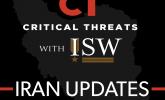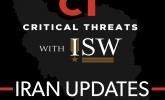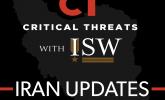February 9, 2023 - ISW PressYemen. Escalating competition within the Yemeni government will reduce counterterrorism pressure on al Qaeda’s branch in Yemen and allow the group to increase its influence in the country’s south. Saudi Arabia and the United Arab Emirates (UAE) support different groups with divergent political objectives in Yemen, and recent Saudi efforts to arm a Yemeni ally may increase discord and infighting within the Yemeni government. This infighting will in turn draw Yemeni security forces away from managing the Salafi-jihadi threat in southern Yemen.
Somalia. A decrease in al Shabaab bombings in central Somalia likely indicates a lull rather than the end of the group’s counteroffensive against the Somali government. Somali forces initiated an offensive to recapture al Shabaab–controlled areas in central Somalia’s Galgudud and Hirshabelle regions in January 2023. Al Shabaab surged explosive attacks in January and early February 2023 in response. The group tends to launch explosive attacks in clusters, so the current decline in attacks may indicate preparations for a larger counterattack.
Mali. Al Qaeda’s Sahel branch is taking advantage of the lack of counterterrorism pressure and state presence in northern Mali to position itself as the primary power broker in the area, including striking agreements with local groups that previously collaborated with French counterterrorism forces. Militants are simultaneously pressuring Mali’s junta with increased attacks in southern Mali. Meanwhile, Mali’s relationships with its foreign partners continue to deteriorate. The junta’s pressure on the United Nations mission in Mali will likely push major contingents to withdraw in the near term, worsening the security vacuum that Salafi-jihadi militants will fill in the country’s north.
Afghanistan. The Islamic State’s Khorasan Province (ISKP) is isolating the Taliban government by targeting its diplomatic relations. This campaign has included both online propaganda and attacks on diplomatic facilities and foreign citizens in Kabul. ISKP attacks delegitimize the Taliban by targeting areas of Kabul that are meant to be highly secure, and the likely presence of ISKP informants in the Taliban government hinders an effective response. Internal tensions in the Taliban government will increase as its isolation and resourcing challenge grows.











